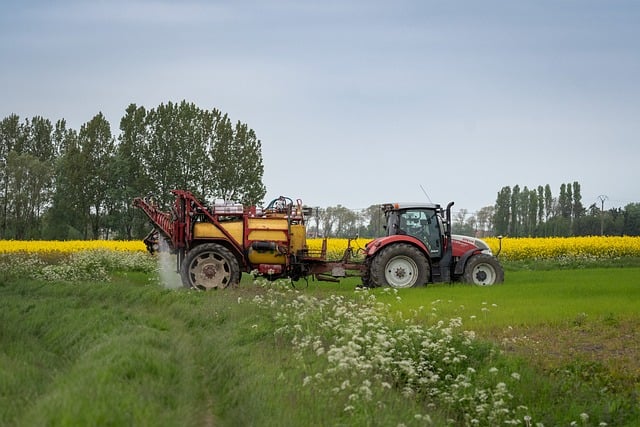
The Debate Over Glyphosate and Its Effects on Health and Environment
Glyphosate, the active ingredient in the popular weedkiller Roundup, has been the subject of increasing scrutiny in recent years. Despite being widely used by the agricultural sector, the controversial herbicide’s potential links to cancer and environmental harm continue to fuel debates.
A new analysis by Pesticide Action Network UK (PAN UK) highlights a significant increase in glyphosate use. This raises concerns about its effects on human health, wildlife, and the environment.
Rising Glyphosate Usage in Agriculture
Between 2016 and 2020, glyphosate usage in the UK agricultural sector increased by more than 16%. The total area of land treated grew by 230,000 hectares. This trend mirrors a broader reliance on chemical herbicides in farming, despite some decreases in overall pesticide application.
Interestingly, PAN UK’s review of the government’s Pesticide Usage Survey Statistics indicates a small decrease in the amount of pesticides used. It also reveals a small decrease in the area of land treated.
However, when looking at the data in terms of kilograms of active ingredients applied per hectare, the outlook seems less favorable. Glyphosate, in particular, remains a widely used and highly potent tool for farmers.
This increase in glyphosate application is troubling, especially considering the herbicide’s classification by the World Health Organization (WHO) as a “probable human carcinogen.”
A study by researchers from the University of Washington and the University of California found that glyphosate exposure increased the risk of non-Hodgkin’s lymphoma. The risk was found to rise by 41% in exposed individuals, Patient Power reports.
More research continues to suggest that glyphosate may be linked to non-Hodgkin’s lymphoma and other cancers. Despite these concerns, the demand for glyphosate-based products remains high, driven by its effectiveness and cost-efficiency.
The Health and Environmental Risks
Beyond its potential carcinogenic effects, glyphosate poses significant risks to wildlife and the environment. PAN UK notes that although the overall use of pesticides has decreased, insecticides have taken their place. As a result, toxic elements are applied with similar intensity, exposing both humans and wildlife to comparable risks.
The continued reliance on glyphosate is a particularly alarming issue, as it is one of the most widely used herbicides globally.
Additionally, the use of other potentially hazardous chemicals has risen. For instance, the use of 2,4-D, a herbicide linked to cancer and endocrine disruption, increased by 117%. Meanwhile, the use of imazalil, a fungicide known to be a developmental or reproductive toxin, rose by 53%.
The use of neonicotinoids, insecticides known for their toxicity to bees, has also remained a concern despite bans on the most harmful variants.
A Growing Threat to Biodiversity Amid the Ongoing Crisis
The environmental impact of glyphosate is significant. The chemical has been shown to harm soil health, water systems, and biodiversity. It can disrupt the balance of ecosystems, particularly by harming pollinators like bees and butterflies, which are crucial for food production.
Given the ongoing biodiversity crisis and alarming species loss in the UK, this highlights a pressing issue. The widespread use of glyphosate and other harmful pesticides presents an urgent challenge.
Legal and Financial Fallout for Bayer
TorHoerman Law reports that the controversy surrounding glyphosate has had significant financial consequences for Bayer AG. Bayer has faced numerous lawsuits alleging that Roundup, and by extension glyphosate, causes non-Hodgkin’s lymphoma and other cancers.
According to the latest Roundup lawsuit update, in the U.S. more than 50,000 cases remain unresolved as of March 2024. Despite settling tens of thousands of cases, the unresolved claims continue to pose a significant challenge for Bayer, both legally and financially.
The financial fallout of these cases has also been considerable. As per BBC, Bayer forecasted a €2 billion loss for the second quarter of 2023, largely attributed to declining sales of glyphosate-based products. The company’s struggles highlight the growing pressure on the chemical industry to address concerns about pesticide safety, as public awareness and legal challenges increase.
Industry and Regulatory Perspectives
While glyphosate’s negative impacts are well-documented, some in agriculture argue its use is crucial for food security and sustainability. David Exwood, vice president of the National Farmers’ Union (NFU), defended glyphosate, stating it is vital for no-till and minimum-tillage systems. These systems help reduce soil erosion and greenhouse gas emissions.
Farmers argue that glyphosate helps to control weeds effectively, thereby reducing the need for other, potentially more harmful pesticides.
However, according to the ENDS Report, critics argue that there are safer, more sustainable alternatives available. PAN UK’s Nick Mole emphasized the need to transition away from chemical dependence in farming. He advocated for nature-friendly methods that prioritize long-term health and environmental sustainability.
On the regulatory side, the UK government maintains that it adheres to strict guidelines to ensure pesticides, including glyphosate, are safe for use. A spokesperson from the Department for Environment, Food and Rural Affairs (DEFRA) stated that glyphosate’s approval is subject to regular review. This review is based on scientific assessment, as with all pesticides.
Despite this, many remain unconvinced by the government’s position, especially given the increasing body of research and the ongoing legal battles surrounding glyphosate’s safety.
FAQS
What alternatives to glyphosate exist?
There are several alternatives to glyphosate, including organic herbicides, crop rotation, and manual weed control. Integrated pest management strategies and sustainable farming practices also reduce the need for chemical herbicides. Additionally, cover crops and mulching can help prevent weed growth naturally.
Which regulatory bodies oversee pesticide use in the UK?
In the UK, pesticide use is regulated by the Health and Safety Executive (HSE) and the Department for Environment, Food and Rural Affairs (DEFRA). Additionally, the UK Expert Committee on Pesticides (ECP) provides independent scientific advice on pesticide regulation.
What is the Roundup lawsuit about?
The Roundup lawsuit involves thousands of claims from individuals. They allege that exposure to Roundup, a weedkiller containing glyphosate, caused them to develop non-Hodgkin’s lymphoma (NHL) and other cancers. Plaintiffs argue that the manufacturers failed to warn about the potential risks.
Overall, the increased use of glyphosate and other hazardous pesticides is a growing concern for both human health and the environment. While some argue that glyphosate is a vital tool for modern agriculture, its risks cannot be ignored.
With the biodiversity crisis deepening and cancer rates on the rise, the call for action is louder than ever. Supporting farmers in transitioning to chemical-free methods of production and encouraging responsible pesticide use is essential for a healthier, more sustainable future. The road to change may be challenging, but it is necessary for the long-term well-being of our planet and its inhabitants.











